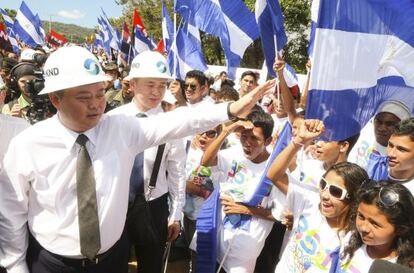Nicaragua begins constructing inter-oceanic canal amid protests
Farmers block roads to demonstrate against $50bn project to link Pacific with Caribbean


Nicaraguan President Daniel Ortega on Monday night officially inaugurated construction work on the massive inter-oceanic canal – a $50 billion project set to rival the Panama Canal. Awarded to Chinese firm HKND to construct and manage for 100 years, the canal will run 278 kilometers across the country to connect the Pacific Ocean to the Caribbean coast. It will be 30 meters deep and is expected to oscillate between 230 and 520 meters wide. “Welcome to Nicaragua,” Ortega told Chinese HKND Group head Wang Jing, who attended the inauguration in Managua.
Wang and Vice President Omar Halleslevens had presided over another groundbreaking ceremony in Rivas province on the Pacific coast earlier in the day. “The future of humanity will benefit from this canal,” Wang said.
But work on the canal is getting under way even as many questions remain unresolved. And neither the Sandinista government nor the construction company has offered any answers. The identity of the investors is still not known, and neither party has presented any studies on the canal’s economic and commercial potential, nor on its environmental impact, even though the government promised to publish a report in November.
Scientists and ecologists are worried about possible damage to the 8,000-square-kilometer Lake Nicaragua. The canal is expected to cut through 105 kilometers of the lake, which will require a massive dredging project. An environmental impact study presented by the Humboldt Center in late September said construction would lead to irreparable damage to the ecosystem. “The canal is a national disgrace in the eyes of the world, especially since, from a scientific point of view, it is unacceptable to start it without carrying out any environmental, technical or commercial feasibility studies,” said Mónica López, member of Grupo Cocibolca, a group of scientists, intellectuals and environmental activists who work together to raise awareness about the possible costs of the canal. “We have warned against the risks this project carries for the country and its citizens.”
Nature, however, is not the only thing at risk. Since Friday, farmers in the affected area have blocked roads on the main highway to the capital to protest against the project because they fear for their lands. An estimated 20,000 people will be affected by the construction – an affront to this traditionally agricultural community. So far, the government has not released the list of expropriations, nor how much it will pay in compensation. On Monday, President Ortega made it clear that thousands of people in the area would be displaced, though he said they would be paid “a fair price for the land.” Expropriations will start in the first trimester of 2015, he added.

“We have said it: over our dead bodies, we will risk our necks here, but we aren’t going to let them rob us of our lands,” said Freddy Orozco, a farmer who lives in the small town of San Miguelito. Across the area affected by the construction, thousands of rural workers have participated in 15 protests. On December 10, 3,000 people, including hundreds of farmers, held a demonstration in Managua.
The farmers’ resistance to the canal is unprecedented in Nicaragua. Fearful that protests would spoil Monday’s groundbreaking ceremony, the government banned the press from accessing the area around Brito, in the south of the country, that lies near the construction site. Neither did officials allow the media to cover the ceremony in Managua, where HKND’s Wang said: “The Chinese who have come to this country have come to build a more prosperous country.”
Tu suscripción se está usando en otro dispositivo
¿Quieres añadir otro usuario a tu suscripción?
Si continúas leyendo en este dispositivo, no se podrá leer en el otro.
FlechaTu suscripción se está usando en otro dispositivo y solo puedes acceder a EL PAÍS desde un dispositivo a la vez.
Si quieres compartir tu cuenta, cambia tu suscripción a la modalidad Premium, así podrás añadir otro usuario. Cada uno accederá con su propia cuenta de email, lo que os permitirá personalizar vuestra experiencia en EL PAÍS.
¿Tienes una suscripción de empresa? Accede aquí para contratar más cuentas.
En el caso de no saber quién está usando tu cuenta, te recomendamos cambiar tu contraseña aquí.
Si decides continuar compartiendo tu cuenta, este mensaje se mostrará en tu dispositivo y en el de la otra persona que está usando tu cuenta de forma indefinida, afectando a tu experiencia de lectura. Puedes consultar aquí los términos y condiciones de la suscripción digital.








































